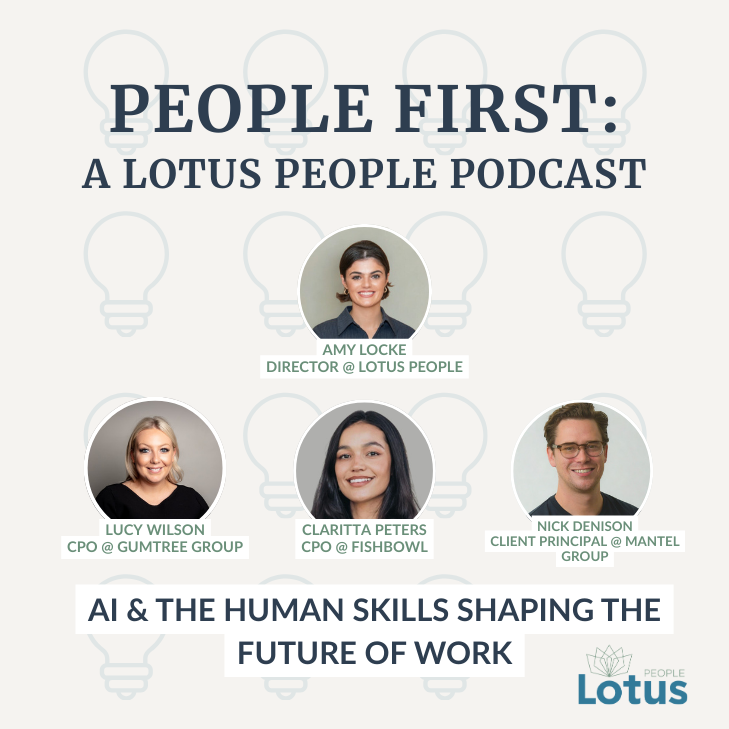We were thrilled to partner with JobAdder for our latest event, aimed at empowering professionals within our network to tackle the challenges in 2024, head-on. We hosted our network of HR, Talent and Leadership professionals at the fabulous eSpaces in Brisbane.
On the expert panel was Kate Drew (Arnold), Chief People Officer at Madison Group Enterprise; Graham Moody, Chief People Officer at JobAdder; Nicola Young, Head of People APAC and Japan at Cognizant; and moderated by our very own CEO and Co-Founder of Lotus People, Sinead Connolly.
We were extremely grateful to have these industry experts share their knowledge and insights with the audience on several core topics shaping the current market. We’ve recapped the key insights shared by our panel below.
On AI and Technology:
The panel shared their views on the transformative adoption of AI and technology on work processes and organisational structures and emphasised the need for innovation to stay ahead of the competition in 2024.

AI has the potential to significantly transform the way we work, with potential to enhance an organisation’s efficiency and productivity in various functions.
In recruitment processes, benefits of integrating generative AI include:
- Streamlining Candidate Sourcing: AI-powered tools can efficiently sift through vast pools of candidate data across multiple platforms, including job boards, social media, and professional network.
- Enhanced Candidate Screening: Technological-based screening tools can analyse resumes, cover letters, and other application materials to identify top candidates based on predefined criteria.
- Improving Candidate Engagement: Chatbots and virtual assistant AIs are increasingly being utilised to engage with candidates throughout the recruitment process, sharing updates on application status, and immediately answering candidates’ queries.
According to Cognizant’s study, as many as 13% of companies could be leveraging GenAI in the next 3 to 4 years, and nearly half could embrace within a decade’s time.
Nicola Young, Head of People APAC and Japan at Cognizant referenced Cognizant’s study that 80% of professionals are still fearful of the impact of AI; although people are eager to learn more about it, they’re also terrified and worried about what it’ll do to their jobs.
For organisations, one thing to remember is that “You have to bring your people on the journey with you,” as per Nicola. “Dig deep as to what you're going to use it (AI) for and how it'll impact people's jobs, and in turn, benefit their roles.”
When used responsibly, AI can open various opportunities and possibilities for professionals to focus on the more human aspects of work and to be present within their day-to-day.
On Candidate Motivators and Trends
The discussion also explored shifts in candidate drivers and motivators impacted by varying external factors, which further highlights the increasing importance of understanding individual motivations within an organisation to foster engagement and retention.
According to Lotus People’s market research, candidate’s main motivators have shifted when compared with results from previous years. Results show that the top five drivers for employees and jobseekers in today’s market are:
- Compensation/Salary Package: 64.7%
- Company Culture and Values: 47%
- Professional Growth and Personal Development Opportunities: 45.1%
- Remote and Hybrid Working Policies: 39.8%
- Work-Life Balance: 38.7%
Of particular significance is the subtle yet notable change in priorities when comparing data from 2023. Whilst compensation has consistently been a significant motivator for candidates in their employment, the importance of this has increased, now emerging as the top priority for most employees and jobseekers.
Amidst the shifting of candidate priorities, professional growth and personal development opportunities stand out as an important motivator, strongly ranking with 45.1% of respondents choosing this as a main priority. This suggests that a large percentage of employees place significant importance on continuous learning and advancement within their careers.
For organisations that do not have employee development initiatives as a focus of their EVP, this finding suggests a need to prioritise investing in L&D programs. Fostering employee learning and growth not only enhances employee satisfaction and retention, but also helps to create a people-focused and innovative culture, ultimately positioning the organisation as an employer of choice in today’s competitive market.
Graham Moody, Chief People Officer at JobAdder said, “It’s investing back into our people, stimulating a culture of learning and growth across the organisation by implementing tools and learning content providers so people have access to fuel their learning and development.”
It’s important to have a central platform for management and employees to share feedback and recommendations, encouraging transparency and collaboration whilst ensuring that both parties have visibility into the progress of learning and development initiatives – creating a culture of continuous improvement where employees feel empowered to voice their needs and aspirations.
To support this, Graham also added, “You can have the best EVP and all the HR programs and initiatives, but if that interface between people leaders and employees isn’t there, it’s all pointless.”
Looking into the Year Ahead

On Gender Pay Gap
In February this year, the Workplace Gender Equality Agency (WGEA) released data that shed light on gender pay gaps within organisations in Australia with over 100 employees.
This legislation follows behind the EU that have had similar transparency since 2017. The aim for changing legislation to publish the gender pay gap data is to encourage organisations to take more addressing internal pay disparities and adopt more robust strategies to ensure fair and equal compensation for all employees, irrespective of gender.
Ways in which organisations can start are by creating compensation frameworks, job levels, and salary benchmarking. Like JobAdder, organisations can also have discussions around internally educating employees on how the gender pay gap data is calculated, and increasing transparency about the business, pay data, and where a company stands on the topic of gender equity.
On Diversity and Inclusion
Lotus People’s market research reveals the growing recognition of the importance of diversity and inclusion in the workplace. With 25% of organisations indicating their intent to review their D&I commitments in 2024, it’s evident that fostering a diverse and inclusive work environment has become a top priority for organisations.
Embracing diversity not only reflects a commitment to social responsibility, but also yields tangible benefits for organisations. By harnessing the unique perspectives, experiences, and talents of a diverse workforce, companies can drive innovation, enhance problem-solving capabilities, and better understand and serve diverse customer bases.
An inclusive workplace culture also promotes employee engagement, boosts team morale, and fosters a sense of belonging – fueling growth and driving success in a dynamic and competitive landscape.
On People and Culture & People Analytics
People play a pivotal role in shaping the success and sustainability of an organisations. The concept of ‘people and culture’ encompasses the values, beliefs, and norms that define the collective identity and working environment within an organisation.
Kate Drew (Arnold), Chief People Officer at Madison Group Enterprise, “People analytics involves the use of data and insights to inform strategic decisions related to workforce management, talent acquisition, retention, performance optimisation, and employee engagement.”
This data-driven approach enables businesses to make more informed decisions, tailor strategies to meet the evolving needs and preferences of their employees, and align organisational objectives with the overarching mission and values.
On the Event
With so much valuable information shared by our panelists, we were delighted with the feedback from our attendees that they’ve gained many actionable insights to improve their talent acquisition and retention strategies and adapt to evolving employee priorities in the workplace. The event highlighted the importance of leveraging data to drive organisational success.
Once again, we want to extend a big thank you to our wonderful panelists, the JobAdder team, and to everyone who attended.
For those who couldn’t attend or for those looking for a recap, you can click on the link below to watch the event video or to download the projected event slides with key highlights and market data.
Lotus People remain committed to facilitating more meaningful conversations and providing resources to help professionals navigate the evolving landscape of work in 2024, and beyond.
Feel free to download our 2024 Market Insights Report where you can learn more about the information discussed during the event by clicking here.
Stay tuned for updates on future Lotus People events!
You may also like...





